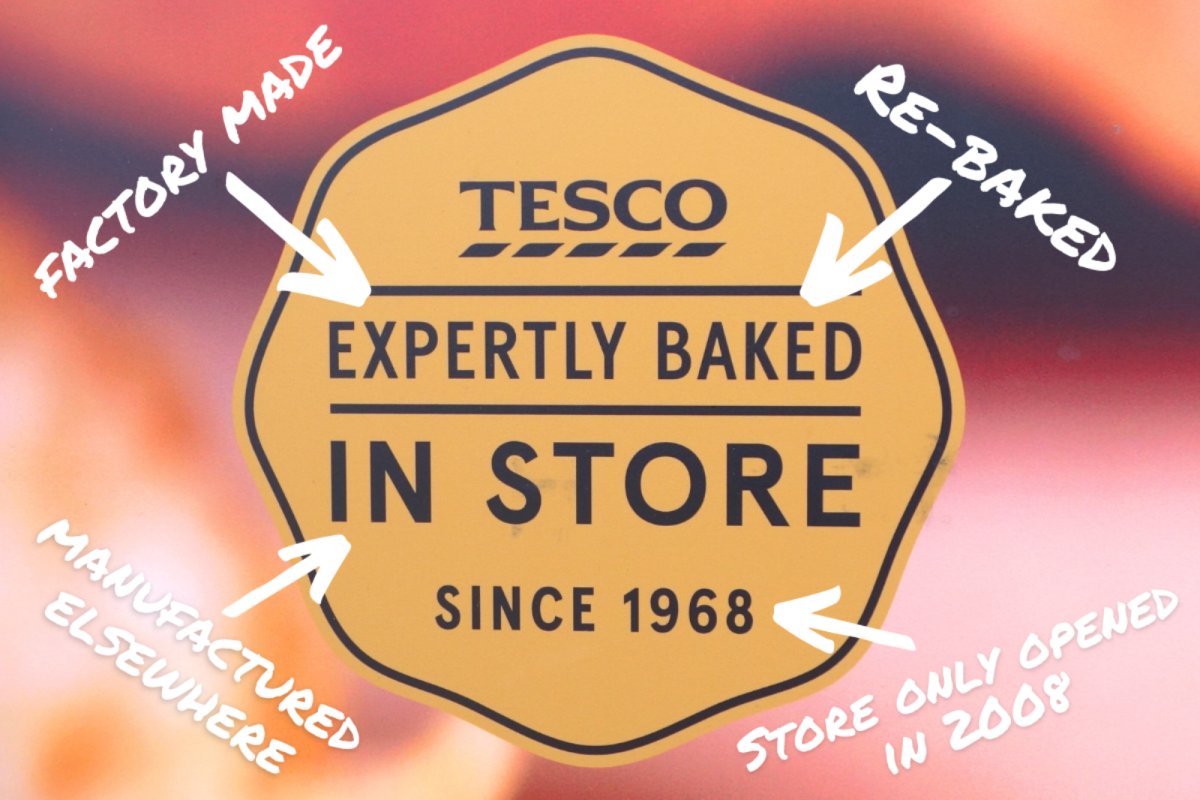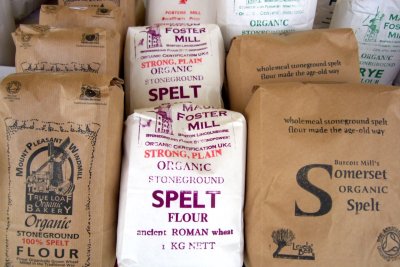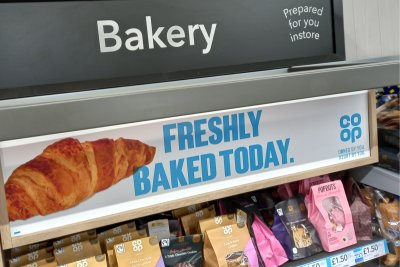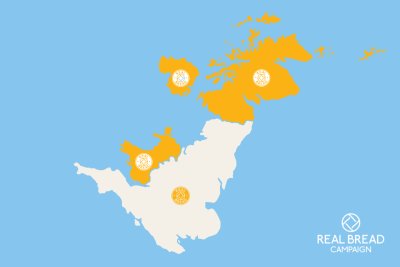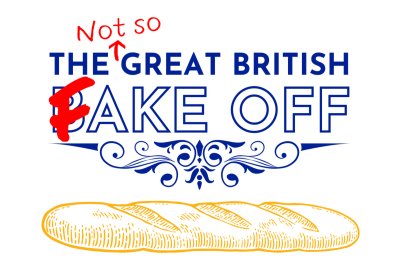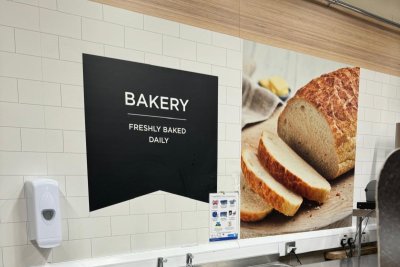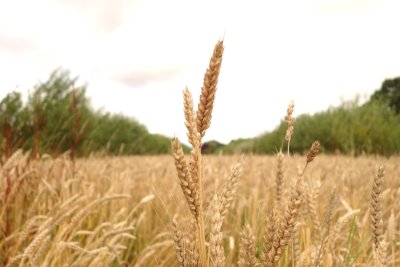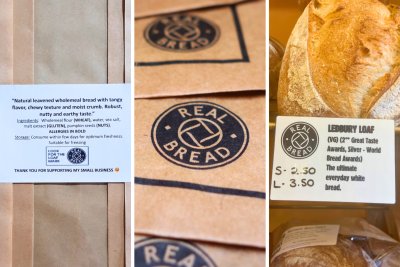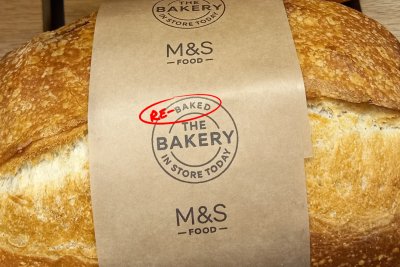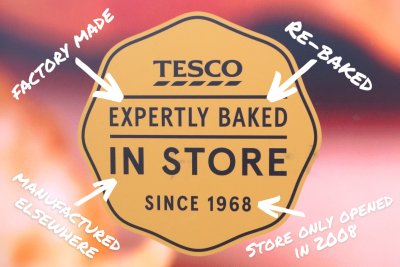 Let's break this down.... Copyright: Tesco (Fair usage)
Let's break this down.... Copyright: Tesco (Fair usage)
Tesco markets ‘bakery’ section products using claims including ‘expertly baked in store since 1968’, ‘baking fresh from our ovens every day’ and ‘freshly baked throughout the day’ on packaging, store displays and its website.
The Real Bread Campaign has found that Tesco uses such marketing at stores:
- Where no bread is freshly baked from scratch on site.
- At which baking expertise is not required.
- That did not exist in 1968.
Nor do the claims accurately describe the low-skilled re-baking of pre-made (and, in some cases, frozen) products that occurs at the vast majority of Tesco stores, and so are not representative of the company as a whole.
The Real Bread Campaign believes that such marketing is misleading and breaches consumer protection regulations. On 28 May 2024, we sent our complaint to Hertfordshire County Council, the local authority with the Primary Authority relationship with Tesco for trading standards.
Real Bread Campaign co-ordinator Chris Young said: “Over a number of years, Tesco has been shutting down in-store bakeries and making skilled baker roles redundant, replacing fresh bread making with staff members loading pre-made products into loaf tanning salons. We’re saddened by the company’s audacity in telling shoppers that things are being expertly, freshly baked and amazed that they’ve been allowed to continue making such claims.”
To be clear, this complaint is not that Tesco is making cheap products widely available, it is about how the company is marketing them.
A re-baked product is not freshly baked
FSA guidance states: ‘Terms such as “freshly baked”, “baked in store” and “oven fresh” may mislead consumers into believing that they are being offered products that have been freshly produced on site from basic raw materials. Some stores sell bread made from part-baked products that have been packed in an inert atmosphere or frozen off-site then “baked off” at in-store bakeries. Use of terms like “freshly baked”, “baked in store” and “oven fresh” on these products could potentially infringe the general legal provisions…’
These provisions include Regulation (EC) No 178/2002, which states that ‘it is a general principle of food law to provide a basis for consumers to make informed choices in relation to food they consume and to prevent any practices that may mislead the consumer.’ More specifically, Regulation (EU) No 1169/2011 requires that ‘food information shall not be misleading, particularly: (a) as to the characteristics of the food and, in particular, as to its nature, identity, properties, composition, quantity, durability, country of origin or place of provenance, method of manufacture or production.’
Tesco uses the claims ‘freshly baked’ and ‘baked in store’ at stores in which pre-made ‘bread’ products are merely loaded into what we call loaf tanning salons - ovens in which they’re re-baked to brown and crisp the crust. Alongside ‘bread’ products, pastries might be made elsewhere and receive their first baking in a Tesco store but this is still not what the average consumer would understand ‘freshly baked’ to mean.
Expertly baked in store?
An expert is a person:
- ‘with a high level of knowledge or skill relating to a particular subject or activity’ (Cambridge Dictionary)
- ‘who is very skilled at doing something or who knows a lot about a particular subject’ (Collins).
Loading pre-made products into ovens to be re-baked can be done by anyone with minimal training and experience as it only requires a very basic level of knowledge and skill. It is not what the average consumer would understand ‘expertly baked in store’ to mean.
Since when?
Tesco makes the ‘since 1968’ claim at sites that did not even exist in the late ‘sixties, let alone at which expert bakers have been making bread fresh from scratch for more than half a century. The company does not offer shoppers any way to check if expert bakers have been employed at a specific site for the past 56 years. We believe that Tesco is using this claim to profit by tapping into the marketing value of heritage, tradition and nostalgia. Whatever the intention, we again refer to Regulation (EU) No 1169/2011.
Unrepresentative of Tesco stores generally
Turning from specific stores to the company as a whole, according to Tesco’s preliminary results 2023/24, as of 24 February 2024, the company operated 3,596 stores in the UK. In February 2020, the company announced that it would only: ‘continue to offer scratch baking in 257 stores.’ Even then: ‘in 201 stores the most popular products will continue to be baked from scratch with other products moving to part-baked.’
Unsurprisingly, slashing the number of scratch bakeries it operates means that Tesco has also been decimating its workforce of what the average consumer would understand to be ‘expert bakers’. Again back in 2020, the company announced ‘Due to some stores doing less scratch baking, as well as the simplified routines these changes will bring, we will unfortunately need fewer colleagues to work in these areas. As a result, there are 1,816 bakery colleagues being put at risk of redundancy.’
Clearly only a tiny minority of Tesco sites (perhaps around 1.5%) bake all products fresh from scratch in store, expertly or otherwise, and the ‘since 1968’ assurance is even less representative across the company’s estate.
Facts frozen out
Regulation (EC) No 178/2002 requires that: ‘The name of the food shall include or be accompanied by particulars as to the physical condition of the food or the specific treatment which it has undergone (for example, powdered, refrozen, freeze-dried, quick-frozen, concentrated, smoked) in all cases where omission of such information could mislead the purchaser.’ Section 6 of The Consumer Protection from Unfair Trading Regulations 2008 states that it is misleading if ‘the commercial practice omits material information’.
Tesco sells products that were made, baked and then frozen (or chilled) at one site, to be transported to and re-baked at another, without declaring this at point of sale or on its website. Tesco then states that the products are freshly baked in store.
Shoppers have the right to know if a product has been re-baked as the process uses around twice as much energy as baking a product once and so can have a negative environmental impact. Re-baking also has a negative impact on the quality of a product in that it is likely to stale more quickly than genuinely fresh bread that has only been baked once. This has potential for negative environmental impact as it increases the risk of food waste in the home, at a financial cost to the shopper.
Misleading merchandising
Article 16 of Regulation (EC) No 178/2002 requires that the: ‘presentation of food or feed, including their shape, appearance or packaging, the packaging materials used, the manner in which they are arranged and the setting in which they are displayed, and the information which is made available about them through whatever medium, shall not mislead consumers.’
The way that Tesco displays ‘bakery’ section products includes paper-lined trays, wire baskets, and industrial grey shelves with wooden edging. These are markedly different from the packaging and painted white metal shelves used in the rest of the store. A Tesco media release stated that the company’s intention of such merchandising was ‘creating a friendlier artisan feel’ and ‘the kind of atmosphere you’d find in an artisan bakery with wooden shelves.’
Whatever the current intentions, Tesco presenting re-baked factory products as if freshly made in an artisan bakery amplifies – and is amplified by – the ‘expertly baked in store’ and ‘freshly baked’ claims, in a mutually-reinforcing marketing echo chamber.
Unfair competition
Tesco markets its baked-off products in direct competition to small, independent, local bakeries that make Real Bread fresh from scratch. These small businesses create well-paid jobs, and help to keep money circulating in local economies, offering training and experience that enables people to become true expert bakers.
This has been going on for more than a decade. A press release, issued by Tesco in June 2023 to generate media coverage for a new product range, claimed that they would be: ‘available for less than the premium prices often found at trendy artisan bakeries.' The release quotes Tesco’s Lead Bakery Product Development Manager as saying: ‘we don’t believe that shoppers should have to pay high prices for artisan bakery items, which is why we’ve launched a new range of great quality products baked daily in store.’
Having closed the majority of its in-store scratch bakeries and made redundant so many bakers to benefit from the economy of scale of centralised production; and having thousands of high margin, non-bakery items (that allow a company to sell ‘bread’ at near– and perhaps below – cost) low prices are hardly surprising.
What we find problematic is Tesco marketing these cheaply mass-produced items in ways that are likely to lead the average consumer to believe they are getting substantively different products made by fundamentally different means.
A long time ago in a bakery far, far away?
Regulation (EU) No 1169/2011 requires that: ‘The indication of the country of origin or of the place of provenance of a food should be provided whenever its absence is likely to mislead consumers as to the true country of origin or place of provenance of that product.’ The regulation goes on to state: ‘In all cases, the indication of country of origin or place of provenance should be provided in a manner which does not deceive the consumer and on the basis of clearly defined criteria which ensure a level playing field for industry and improve consumers’ understanding of the information related to the country of origin or place of provenance of a food.’
We understand that some Tesco ‘bakery’ section products are made outside the UK but this is not declared on labels, point of sale displays, or product pages on the company’s website. This deprives shoppers of important information and so further contributes to unfair competition with bakeries that make bread fresh from scratch in the UK. Again, this compounded by Tesco’s claims of when, where and how the products were made.
Send us your photos
We’re still collecting examples of apparently misleading ‘bakery’ section marketing to see if complaints need to be made against any of the UK’s nine other largest supermarket chains. Find out more.
Updates
24 June 2024: LBTH confirmed that they had referred our complaint to Hertfordshire CC.
21 June 2024: We again asked LBTH for confirmation that they had passed our complaint to Hertfordshire CC.
18 June 2024: LBTH replied "Please can you summarise the issues in respect of Tesco, and I will forward your concerns to Hertfordshire CC," so we sent our complaint to LBTH again.
17 June 2024: We asked LBTH for confirmation that they had passed our Tesco complaint to Hertfordshire CC.
6 June 2024: While waiting for someone at LBTH to play go-between, we sent our original complaint to a senior trading standards officer at Herts, with whom we're in correspondence on a case regarding another company. The officer replied that they did not work on Tesco cases and we would need to reach the correct officer via LBTH.
4 June 2024: A trading standards officer at LB Tower Hamlets replied: 'In most London Boroughs, Food work is done by Environmental Health Food Teams, so that would be the best team to deal with this issue.'
We responded that we had copied both departments into the email and so hoped that a member of the EH team had referred it back to Hertfordshire CC already.
30 May 2024: The trading standards department of Hertfordshire County Council responded: 'We act as a single point of contact for Enforcing Authorities who may refer complaints and issues to us regarding Tesco. We can share the information you provide (which we have done so far) with Tesco but as you are not a UK enforcing authority any referral would need to be made by your local authority once they have assessed any claims.'
We replied that, as this is a national-level complaint against a company operating nationally, asking Hertfordshire's trading standards colleagues at London Borough of Tower Hamlets to play go-between feels like creating unnecessary extra work for them. We did, however, do this as requested, sending the complaint to the trading standards and environmental health/food safety teams at LBTH.
See also
Real Bread Campaign: The Real Bread Campaign finds and shares ways to make bread better for us, better for our communities and better for the planet. Whether your interest is local food, community-focussed small enterprises, honest labelling, therapeutic baking, or simply tasty toast, everyone is invited to become a Campaign supporter.
Sustain
The Green House
244-254 Cambridge Heath Road
London E2 9DA
020 3559 6777
sustain@sustainweb.org
Sustain advocates food and agriculture policies and practices that enhance the health and welfare of people and animals, improve the working and living environment, promote equity and enrich society and culture.
© Sustain 2024
Registered charity (no. 1018643)
Data privacy & cookies
